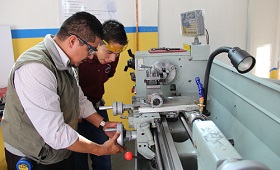Vocational education and training - an important and future-oriented issue in the German-Mexican relationship
Federal Foreign Minister Steinmeier travels to Mexico on 6 June for the start of the country's Year of Germany. In light of this, Ms Martina Klumpp, head of the Business and Global Issues department at the German Embassy in Mexico City, outlines the prospects, in particular in terms of collaboration in vocational education and training.

There has been a sharp rise in the level of interest from Mexico in vocational education and training over recent years. The shortage of skilled workers is now becoming an urgent problem in some regions and sectors in Mexico’s emerging economy. This problem will further escalate over the coming years due to new large-scale investment projects in the automotive sector in the Bajío - the industrial belt in central Mexico. Demand is greatest primarily in the automotive and aviation sectors, but also in the energy sector and in tourism.
The German system of vocational education and training is attractive for emerging industrial nations such as Mexico. It offers high standards of vocational education and training, increased productivity, transfer of know-how, increased competitiveness and reductions in youth unemployment. Dual vocational education and training supports networking between the education and training system and the employment market. Ultimately, all parties involved stand to benefit: Mexican businesses obtain the personnel needed to precisely meet their operational requirements and trainees benefit from the chance to acquire competencies which help them to gain a foothold in the employment market. Also, they already start receiving a salary while training. For many lower middle class Mexican families who are forced to survive on approx. € 250 per month, the contribution of each family member to the family upkeep is critical. In this respect, even a modest training salary will be an incentive. Qualification and work experience will enable the skilled worker to advance socially in the future.

Mexico is very interested in a dual vocational training system following the German model. The Federal Institute for Vocational Education and Training (BIBB) has been cooperating with the National College of Tech-nical Professional Education (CONALEP) since 2009. In Autumn 2013, the Mexican Ministry of Education (SEP) and the National Employer's Association (COPARMEX) worked together with the German - Mexican Chamber of Industry and Commerce (CAMEXA) to start developing a Mexican model of dual vocational education and training (MMFD). This is well on track and a pilot project has been successfully established. Since early 2016, the GIZ has been advising Mexican partners on behalf of the BMZ on the systematisation and on expanding the pilot project. The Federal government has provided € 5 million for this purpose and the Mexican government is generating the same amount from its own resources.
The BMBF has engaged GOVET (German Office for International Cooperation in Vocational Education and Training) to advise on the issues of “Institutional and legal frameworks for dual vocational education and training” and “Research and development in dual education and training”.
Vocational education and training is also a central theme in political discussions between heads of govern-ment and foreign ministers. For example, on his official visit to Germany on 11 and 12 April, President Peña Nieto underlined the importance and excellent example of the dual vocational education and training in Germany.
The issue vocational education and training is also at the centre of the Year of Germany in Mexico. When Federal Foreign Minister Steinmeier opens the Year of Germany on 6 June, vocational education and training will form an element of his programme. There will be an exchange of ideas between Mexican and German companies who will talk about their experiences with dual vocational education and training.
In the following week, more than 60 German companies including vocational education and training providers will present their services at a major exhibition “EXPO Hecho en Alemania” in Mexico City. They are enjoying a higher and increasing level of demand in Mexico. On the second day, a symposium will accompany the exhibition entitled “Success factors of dual vocational education and training”. GIZ, CAMEXA and the BIBB, together with their Mexican partners, will introduce themselves to a broad audience at the symposium. The intention here is to focus on the exemplary partnership between the public and private sector in the implementation of dual vocational education and training in Germany. Mexico is taking steps towards establishing this partnership and is interested in learning from the German example.
Further events are planned on the theme of vocational education training over the course of the Year of Germany in Mexico which will run through to mid 2017.